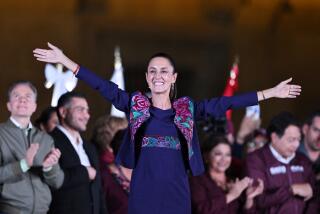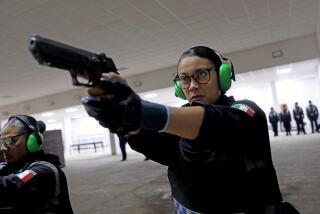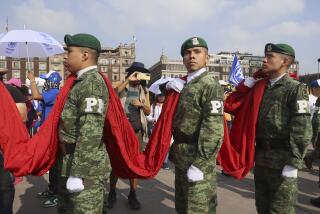Separatist City of ‘Mandela’ : Boston Voting on Proposal to Let Black Areas Secede
Signs of Boston’s economic boom appear almost everywhere these days, from busy construction cranes downtown, to pleading ‘help wanted’ cards in shop windows, to lowest-in-the-nation unemployment of 3.3%.
But signs of a different sort are tacked to the street lights and boarded-up storefronts in Boston’s mostly black, mostly poor inner city.
Those red-and-white posters call for 22% of Boston’s 600,000 residents to legally secede from this historic city to form an independent 12.5-square-mile city called Mandela, in honor of jailed South African black nationalist leader Nelson Mandela.
The radical proposal, in the form of a non-binding resolution on Tuesday’s ballot, has divided black leaders, confounded local politicians and raised racial tensions in the six neighborhoods affected by it.
Proponents say the plan would foster local control of economic development and help such long-blighted areas as Roxbury and Dorchester fight high crime, illegal drugs, poor schools and dirty streets.
“We’re talking about self government and self control,” said Curtis Davis, 33, a Harvard-trained architect who helped organize the Mandela campaign. “No one can manage your affairs better than you.”
But critics, including Mayor Raymond Flynn and prominent black church leaders, say Mandela is not the answer to persistent social and economic problems.
“I think it’s a diversion,” said the Rev. Charles Stith, a Roxbury minister and chairman of the Campaign for One Boston, an opposition group of civic and church leaders. “We believe that, by removing ourselves from the political context, we lose the economic opportunities and political leverage we’ve created in recent years.”
Although supporters have organized a series of debates and rallies and plan to distribute 45,000 leaflets before Election Day, adoption of the resolution appears unlikely.
Voters Oppose Plan
Recent polls show likely voters are 3 to 1 against the proposal. Even if it is adopted, the state Legislature would still have to approve a bill to create the new city, and Gov. Michael S. Dukakis has said he would veto any such attempt to break Boston apart.
However, critics say the very existence of the proposal has revived racial tensions in a city torn apart in the mid-1970s by struggles over court-imposed busing to end school segregation. Some fear that a sizable number of white voters will support the resolution to rid the city of blacks.
“What this whole separatist concept has done is fan the flames of racism among some whites,” said the Rev. Bruce Wall of Roxbury’s 12th Baptist Church. “Racism was sleeping. It wasn’t dead. Now the whole racial harmony is in jeopardy.”
Some Blacks Angered
Mandela’s boundaries were specifically drawn to include only neighborhoods with a majority of nonwhite residents. And that angers some blacks.
“I don’t go for it,” said Frederick Brown, 65, a Roxbury resident who owns a small grocery. “Why do they want to separate us? It’s discrimination.”
But Davis counters that Boston’s blacks already are segregated. “Physically, economically and socially, the barriers already exist, and we didn’t create them,” he said. “It’s a question of controlling our community. And there’s nothing racist about that.”
Most civic leaders credit the Flynn administration with reducing Boston’s racial strife since his election in 1983. Moreover, blacks have made significant political and economic gains in recent years.
Flynn’s job policy sets a goal of 25% minority hiring for major construction projects in the city, and he has chosen minority-member developers to build on public land. Blacks now serve as City Council president, superintendent of schools, city treasurer, city auditor and head of the Boston Redevelopment Authority.
Inequities Cited
Bruce C. Bolling, City Council president and Boston’s top black elected official, opposes the Mandela proposal, but he said it has focused needed attention on the inequities of fast-paced growth and problems with city services.
“In certain respects, Boston now is like Dickens’ ‘Tale of Two Cities,’ ” Bolling said. “It is the best of times. It is the worst of times . . . . The issues are real and legitimate. No one is satisfied with the quality of life in the greater Roxbury community.”
Mandela would include parts of Roxbury, Dorchester, Mattapan, the Fenway, Jamaica Plain and the South End. The population of more than 100,000 would be overwhelmingly black and Latino.
Except for encroaching gentrification in some places, much of the area that would make up Mandela has been left behind in Boston’s boom. It is 85% residential, with dozens of littered and vacant lots, blocks of decaying three-story brick row homes and several sprawling public housing developments. It includes Boston’s lowest income and highest crime districts.
Big Tax Hike Seen
A study commissioned by Mayor Flynn and released in early October showed that Mandela would face a $135-million deficit in its first year. The study said also that Mandela would have to raise residential property taxes by 61% and commercial and industrial property taxes by 44% to compensate for its reduced tax base.
But Mandela supporters dismiss the study’s figures as deliberately misleading.
“What the city has done is run a fear campaign to scare people,” said Kenneth Wade, chairman of the Greater Roxbury Neighborhood Authority, a community group. “Raising taxes 61%? That’s so bogus it’s not serious.”
Watching nervously from the sidelines are some of Boston’s most prominent institutions. Mandela’s proposed boundaries would take in Boston Symphony Hall, the Boston Museum of Fine Arts, Northeastern University, the John F. Kennedy Library, the University of Massachusetts city campus, part of Harvard Medical School and the offices of the Boston Globe.
Paper Denounces Plan
The Globe has denounced the proposal, saying voters should “ask themselves if Boston would be the better financially or otherwise with the loss of 47 schools, a police station and substation, Boston City Hospital, eight libraries and 22% of its population.”
Even some supporters of the proposal have started to have second thoughts. “I think it’s divisive between blacks,” said Ben Haith, who heads the anti-crime unit of the Roxbury Multi-Service Center. “I see fear, I see confusion, I see insecurity, I see lack of understanding.”
“Unfortunately,” he said, shaking his head, “my feeling is the community stands to lose now no matter how the referendum is voted.”
More to Read
More to Read
More to Read
Start your day right
Sign up for Essential California for news, features and recommendations from the L.A. Times and beyond in your inbox six days a week.
You may occasionally receive promotional content from the Los Angeles Times.




